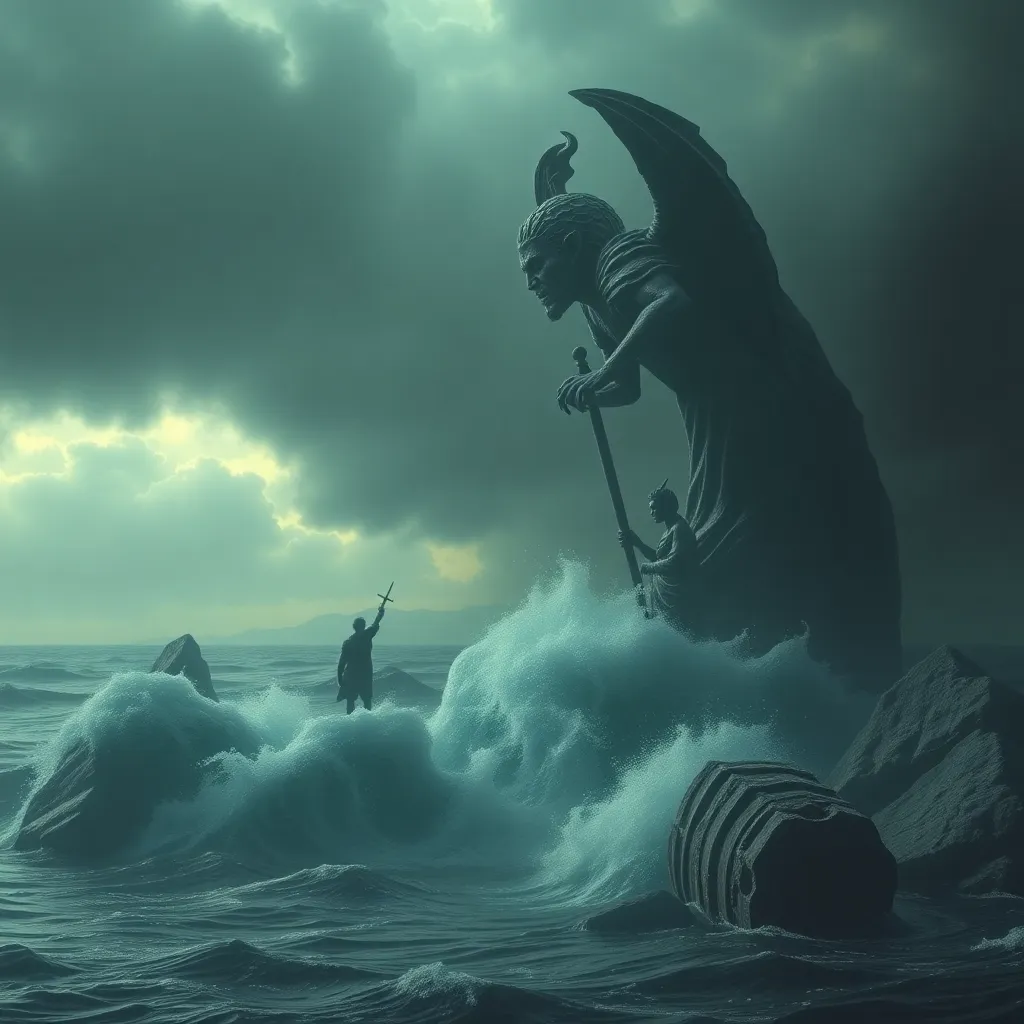The Ethical Dilemma: Using the Scylla and Charybdis Myth to Explore Modern Moral Conflicts
I. Introduction
The myth of Scylla and Charybdis, stemming from ancient Greek folklore, presents a vivid portrayal of navigating perilous choices. Scylla, a monstrous sea creature, and Charybdis, a treacherous whirlpool, symbolize the daunting nature of decision-making when faced with two equally hazardous options. This myth serves as a powerful metaphor for ethical dilemmas, wherein individuals must choose between two undesirable outcomes.
Ethical dilemmas are situations where a person is confronted with conflicting moral principles, making it challenging to determine the right course of action. This article aims to connect the wisdom of ancient mythology with contemporary moral issues, exploring how the Scylla and Charybdis narrative can illuminate our understanding of ethical challenges today.
II. Understanding the Scylla and Charybdis Myth
The tale of Scylla and Charybdis is famously recounted in Homer’s “Odyssey.” As Odysseus attempts to navigate the Strait of Messina, he faces the terrifying choice of sailing too close to Scylla, which would devour some of his crew, or risking his entire ship by venturing too near Charybdis, which threatens to swallow them all. This narrative encapsulates the essence of ethical dilemmas: the struggle to make a choice when facing great risks.
Symbolically, Scylla and Charybdis represent the stark contrasts in moral choices. Scylla embodies the immediate and personal sacrifice for survival, while Charybdis represents the broader consequences of failing to navigate correctly. The historical significance of this myth lies in its ability to convey the complexities of human decision-making, resonating through centuries as a cautionary tale about the perils of choice.
III. Defining Ethical Dilemmas in Modern Context
At its core, an ethical dilemma arises when an individual must choose between two or more conflicting moral imperatives. The choices often involve significant consequences, which can weigh heavily on one’s conscience. Common ethical dilemmas faced today include:
- Choosing between honesty and loyalty
- Deciding between profit and environmental sustainability
- Balancing personal beliefs against the expectations of society
Personal values and societal norms play crucial roles in shaping these dilemmas. What one individual views as an ethical obligation, another may see as a violation of their principles. This subjectivity adds layers of complexity to moral decision-making, prompting individuals to reflect deeply on their choices.
IV. Parallels between Myth and Modern Moral Conflicts
The connections between the myth of Scylla and Charybdis and contemporary ethical issues are striking. For instance, in the healthcare sector, professionals often face dilemmas similar to Odysseus’ predicament. They must choose between:
- Providing care that may not yield positive outcomes (Scylla)
- Withholding treatment that could potentially save costs but risk patient well-being (Charybdis)
Environmental ethics also presents a modern parallel. Companies and individuals often grapple with decisions that pit economic growth against ecological preservation. The choice to exploit natural resources can lead to immediate benefits but pose long-term consequences for the planet.
In both cases, the essence of the dilemma remains: navigating between two perilous outcomes, much like Odysseus’ fateful journey through the strait.
V. Psychological and Emotional Impact of Ethical Dilemmas
The stress associated with decision-making in ethical dilemmas can be overwhelming. Individuals often experience anxiety and uncertainty as they weigh their options, fearing the repercussions of their choices. This emotional turmoil is compounded by cognitive dissonance, where conflicting beliefs create mental discomfort.
Myths like that of Scylla and Charybdis can provide a framework for understanding these feelings. They serve as coping mechanisms, allowing individuals to contextualize their dilemmas within a narrative that has endured through time. By reflecting on the choices faced by mythological figures, one may find solace and guidance in navigating their moral landscapes.
VI. Lessons from Mythology for Modern Ethics
Analyzing the Scylla and Charybdis narrative reveals several insights applicable to contemporary ethical reasoning:
- Awareness of consequences: Understanding that every choice has potential repercussions encourages careful consideration.
- Acceptance of imperfection: Recognizing that there may not be a perfect solution can alleviate the burden of decision-making.
- Empathy for others: Considering the perspectives of those affected by one’s choices fosters compassion and understanding.
These lessons can guide individuals in forming ethical frameworks that prioritize thoughtful decision-making and moral integrity, drawing on the wisdom embedded in ancient myths.
VII. The Role of Society and Culture in Shaping Ethical Choices
Cultural narratives significantly influence how individuals perceive right and wrong. Communities often uphold specific moral codes that shape the decisions of their members. The impact of community and peer pressure can be profound, swaying individuals toward certain choices, even when those choices conflict with personal beliefs.
Engaging in dialogue and discourse is essential for resolving moral conflicts. By discussing ethical dilemmas within a community, individuals can gain diverse perspectives and deepen their understanding of complex issues. This collective approach not only enriches moral reasoning but also fosters a culture of empathy and respect.
VIII. Conclusion
The connections between the myth of Scylla and Charybdis and modern ethics are both profound and revealing. Ancient narratives continue to resonate, offering timeless lessons that can inform our moral compass in contemporary society. As we navigate our own ethical dilemmas, reflecting on these stories may provide clarity and insight, encouraging us to engage more thoughtfully with the choices we face.
In a world rife with complex moral issues, let us draw inspiration from these ancient tales, employing their wisdom in our quest for ethical understanding. By doing so, we can embark on a journey of introspection, ultimately enriching our moral lives and the societies we inhabit.



